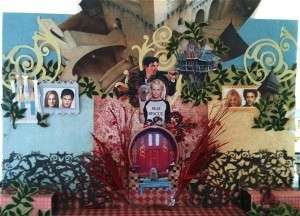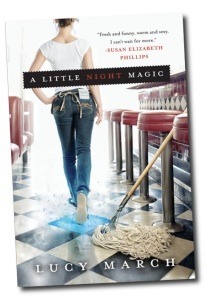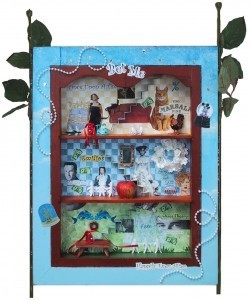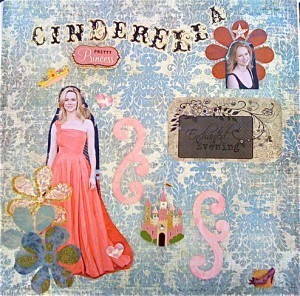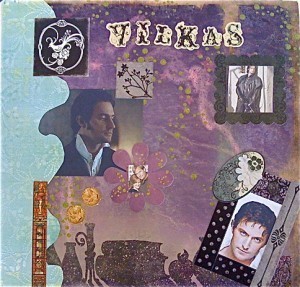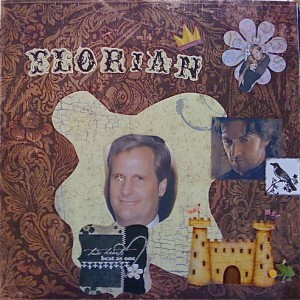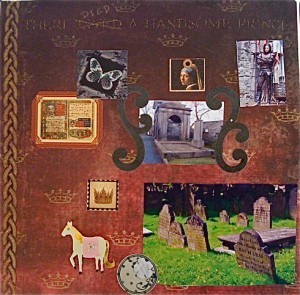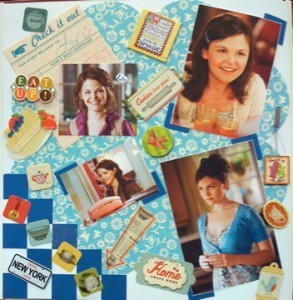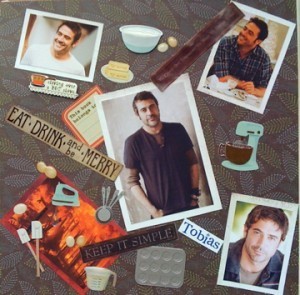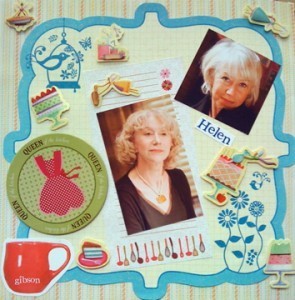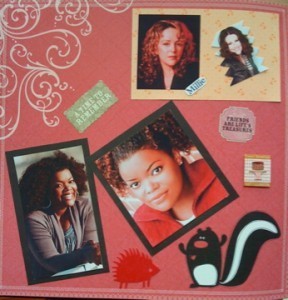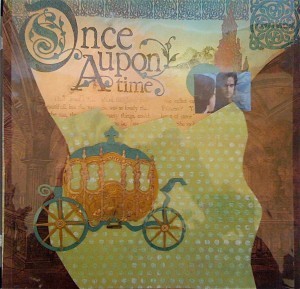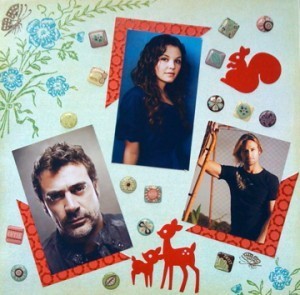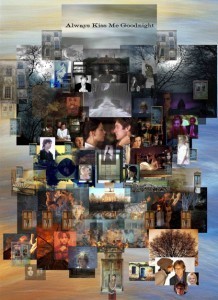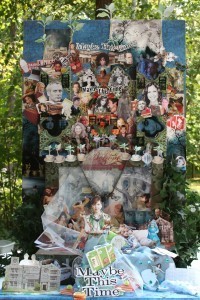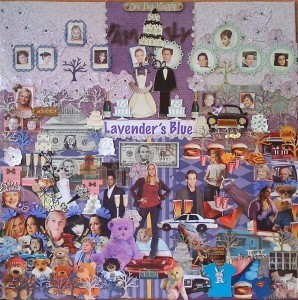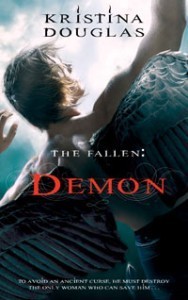Jennifer Crusie's Blog, page 314
February 14, 2012
Happy Valentine's Day!
Happy Valentine's Day to Argh Nation. Have some of that violently-colored Valentine's candy for me since I can't. (Love those cinnamon hearts.) And here's something interesting: Mollie just discovered that the Welcome to Temptation and Bet Me e-books are currently bundled for one low price of $6.99, which makes them about $3.50 each which the very-long-runnng poll to the right says is a reasonable price for an e-book.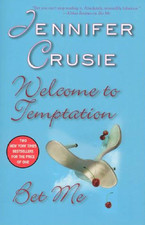
Crusie on the cheap, available at Barnes & Noble, Kobo, iTunes, Android Market, the Sony eBookstore, and Amazon.

February 12, 2012
Fairy Tale Mistakes, Fixed
One of the things that Lani and Krissie and I have been talking about is our long-delayed collaboration on Fairy Tale Lies. It's been long delayed because we all have other books we have to finish first, but we love the idea and we love our characters and plots . . .
Actually that wasn't true. We all loved their characters and plots. Lani's writing a really pissed-off Rapunzel who just got scammed by a wolf in conman's clothing who looks a lot like Robert Downey, Jr., and Krissie's writing a really pissed-off Cinderella who just got dissed by a Grand Vizier who sounds a lot like Alan Rickman. (When you're collaborating, you have to give your collaborators concrete references until you're far enough into the book that all the characters become who they're going to be and are clear to everybody.) I was writing Red Riding Hood as a grandmother who goes into the woods to keep her teenage granddaughter from making the Family Mistake and ending up knocked up by a wolf. Lani and Krissie were fine with it, and I loved all the metaphor-and-symbolism richness of Red going back into the woods as an adult, but I couldn't make it catch fire for me. I collaged it, I wrote the intro scene for it, but I could not make it work. Which was okay, I have Liz and Zelda's books to work on. But it bugged me just the same.
So this time when we were sitting in front of the fire with handwork and tea, and we talked about the back story for the antagonist, I said, "I don't want to write Rip [our Big Bad], but I'd love to write Goldie [his henchwoman]." I've written the antagonist on the two previous collabs–Xan and Kami–but I had no interest in Rip, and Lani loves his placeholder (have you seen Dodgeball?) so everybody was happy. Except Goldie doesn't have a POV, so I didn't have much scope. She's just a grown-up Goldilocks who lives in the woods in a gypsy caravan and guides people through to the other side so they don't get killed by the wildlife, human and animal, and spies for Rip. She's little and cute and blonde and lethal: do not fuck with Goldilocks, she was raised by bears. When we first brainstormed her, she was Kristin Chenowith, but I kept seeing her as more of an Amy Poehler, bright and pretty and savage.
The more I thought about Goldie in that caravan, the more intrigued I was. She'd have a fluffy little poodle like our Mona, and she'd name it our nickname for Mona: The Iron Muffin. And Muffin would be like Goldie, bright and cute and little, with teeth that can rip your throat out. Wolves would back away from Muffin. And then there was that brightly painted gypsy caravan . . . I loved the idea of that caravan.
Okay, you've seen this coming a mile away, but I didn't. It took until last night for me to say, "I think I want to switch heroines." It was really hard because I LOVE the Red Riding Hood story, I have many books analyzing the Red Riding Hood story, but that was all intellectual. Goldie got me viscerally, and you can figure out intellectural but you cannot create visceral. Plus Goldie's back story, once I started on it, actually made more sense than Red's in the context of this particular conflict. Plus The Iron Muffin. I wished Red the best of luck and moved into Goldie's caravan.
Of course that meant I had to find Goldie a hero, peel off my old character pictures from the Fairy Tale Lies collage and put the new characters up, and figure out exactly what's going on with their story together (because although there's an overall plot of Our Girls against the Big Bad Rip, this is essentially a triple romance novel), but that's all easy now because Goldie is so My Girl. Plus so much fun stuff: When the hero says, "I was raised by wolves," Goldie says, "Tell me about it. My brother is a bear," and neither one of the realizes the other one is being literal . . . well, I just get all happy inside.
Here's the revised start to my collage. (Lani and Krissie are doing their stories on scrapbook pages; this is just Goldie's story although the other two heroines are definitely part of it which is why they're there to the left and right.) There'll be a ton more stuff on here by the time we're finished, but that'll happen as we work because we're definitely going to write this one.

February 9, 2012
Blog Ramble
I've been thinking about blogs lately. For awhile there everybody had a blog, and then there was that rumor going around that blogs were no longer The Thing and everybody went to Facebook, and now I don't know what the Convention Wisdom is, I just know I like blogs. So this is a very long ramble about blogs, all of it me just trying to figure out what I think. Feel free to jump in. We're not trying for a conclusion here, just thinking about blogs.
I think the reason for starting a blog defines that blog, and the reason so many blogs run into a wall is that either that the blogger doesn't have a clear goal or the blogger loses that goal along the way and becomes aimless. That doesn't mean the goal for the blog can't evolve, just that I think the blogger has to be aware of what she's doing all the time and occasionally reboot her head so she's got that clear direction. Argh started because Mollie wanted fresh content on the webpage, so she asked me to blog on something once a week and to keep the contents closed. That was a very clear, very practical goal, but once I started, I realized that Argh was my place to do essays or lectures or rambles, and that if I enabled the comments, all that stuff became conversations. So Argh quickly evolved into a place for me to throw out ideas and see how they bounced. The interactions shaped the blog, the commenters shaped the blog (thank you, Argh People), but it still had to be my voice, my place: my reasons for doing Argh still provide the shape, which has changed as my goals have changed.
But along the way, I needed to do things that weren't right for Argh, and that's where the other blogs came in. Bob and I wanted to talk about a year on the road promoting one book while writing another, and the He Wrote, She Wrote blog was begun as blatant PR, which it continued to be until the end. But it also evolved because of the way our business relationship evolved and even more because of the way the commenters shaped it (thank you, Cherry Bombs). It became the blog version of a reality show: we never knew what the hell was going on there because our lives were so chaotic, and that added to the variety and color and tension (lotta tension). I loved that blog, but it was a relief when the year ended because it was a demanding sucker during a demanding time. The next year we did a writers' workshop that was demanding in a different way, and again, it was only meant to last a year. I think project blogs like those and Popcorn Dialogues should have an end time. "This is what we want to do and this is when we'll finish doing that." It makes it rough on the community, but if the goal is achieved, the blog is over. Of course, you can begin a new project under the same banner; we did a romcom series on PopD and now we're doing mysteries, but both had an end date: when we get to this point, we'll stop and draw conclusions and then that series will be over. For research, teaching, analysis, the finite blog really is best.
There are other reasons to blog but I think they get dicey. You can blog to promote your business which in my case is selling books, but I think that shifts your relationship to your audience. I think as a blogger (and as marketer), your main determinant of blog content (after your goal) is your audience: Is this content something that is good for them, good not in the sense of moral or beneficial but good in the sense that it works for them, entertains them, intrigues them, engages them. Occasionally I got into too much navel gazing here which was bad for Argh, but when Krissie wanted to start ReFab, she made "gaze into navel" the goal. I can post things there that would warp Argh, I think, but I can post things here that wouldn't work over there. The interesting thing to me is that there's so much crossover in the audience, which means the community hasn't changed between the two blogs but the expectation has. My need for a place to talk about ideas fuels Argh, Krissie's need to talk about growth fuels ReFab, but the commenters' needs shape both.
I think that synergy is the key to a successful blog. People talk about driving traffic to a blog, but it's not about driving anybody, nor is it about large numbers. A successful blog can have only twenty people who follow it. My critique group has a private blog; there are under twenty people on there but it's been going strong and steady for several years now, not because we critique any more (although we do occasionally say something like, "We should do that again") but because we're the Glindas and we go there to vent and get support and sympathy and share OK Go videos. I don't know how many people are reading Argh (somebody else keeps track of that and cares), but I know the people who comment are the ones who've made it what it is because I consciously and subconsciously respond to that feedback. I'm fairly sure the numbers rise and fall, but the numbers aren't the criteria for the success, the feedback is.
I think the whole "lots-of-readers-equal-success" idea comes in part because of the idea of monetizing the blog, putting ads on to generate income based on page hits, but that's always seemed counterintuitive to me. Obviously, this blog serves a purpose in selling books, but I don't think money can be THE purpose. People know when your main goal is to separate them from their cash, and even ads along the side subtly tell readers that. If your blog is a professional one, say Huff Post, Gawker, Smart Bitches, then the ads don't matter, people who come there know it's a business site. But on a personal blog like this one, I don't think it works. I think when people show up at a personal blog, they want a clean, easy-to-read environment (no clutter with ads) and clear, non-exploitive content that may lead them to buy something (say, a book) without directly selling them something. The interviews we do here are clearly intended to encourage people who like the sounds of the book being talked about to buy it, but the major goal of those interviews is to inform people about the book and to entertain. And I think that last one is the most important.
I think that too many bloggers that think that because they want to say something, people should want to read it, and that's backwards. You start with "Why would people want to read this?" and then you couch what you want to say in a way that makes people want to read it. You choose your theme for you, but you write for an audience. (Of course, even as I say that, I'm writing a rambling post for the purposes of organizing my own thoughts, but you were warned about that up front.) So I think the big question for any successful blogger is, "Why would anybody want to read this?" I know it seems like Argh is a goulash blog where anything goes, but you'd be amazed at how many posts never see the light of day because I can't answer that question about them. Audience always comes first.
Which is another thing about blogs: There's a helluva lotta maintenance work that goes into keeping the place nice for the audience. I spend a lot of time checking comments, deleting spam, making sure everything is civil, and of course writing content. A blog has to move and grow, and that takes a lot of oiling the wheels behind the scenes and paying attention, not just to the commenters, but to the audience as a whole. The vast majority of people who read a blog never comment, but they're still out there reading, and you have to be aware of that, to remember that the blog is not just a conversation between you and your commenters, that the stuff you put on the net goes places you cannot imagine, and that therefore your blog had better be a tightly run machine.
ReFab has been interesting for me on all these points. We started it forty days ago because Krissie wanted a place to journal on the net to keep herself honest in her efforts to become more mentally and physically healthy. She asked me to set it up for her and to blog with her, and I said sure on the set-up, but that I couldn't blog every day the way she wanted to. Argh is my first blog priority and we're still doing PopD once a week, so a third blog was going to have to be something very low key for me. We figured we'd get a hundred old friends maybe, it'd be a little thing in the corner of the net where we'd count calories and talk about stress reduction. Krissie didn't care about the look of the place, so I found a template I liked and designed a logo and showed it to Lani who said, "Uh, no," and re-designed it and I said, "Uh, no" and redesigned her redesign while Krissie kept saying, "You guys are working too hard at this, it's just a little blog." Took us a day and a half to get the very plain, very simple blog we put up because Lani and I knew that the look of the place is what sets the tone. (I think Argh needs to look lighter these days, so we're working on that for spring.)
Then on Jan. 1, we opened ReFab and mentioned it on our main blogs. Krissie mentioned it on a social network she's on. That was it for marketing. We didn't (and still don't) care about traffic. We're not selling anything there, not even books. We're just talking about changing things–skin, furniture, lives, etc.–and arguing about kale. For reasons I still do not understand, it grew like kudzu, and the unique visitors and page views numbers are way past a hundred. Or as Alastair said when he looked at the stats, "This is impressive." But the thing is, for ReFab, that's just nice, it's not necessary. We built that blog for personal growth, not for page hits. The fact that a lot of persons joined us for growth is heart-warming but not essential. The blog is serving its purpose: we're all three healthier and happier because of what we're doing there. It's a success.
So I think the most important things about blogging are that the blogger knows what her goals are for the blog and that she knows what her audience needs and wants, and she blends those two things into one concept and then keeps the blog on that straight line, letting it evolve as she enters into a dialogue with the community but never letting it lose its direction and identity.
I think. As I said, a ramble. What do you think?

February 7, 2012
Here's the Problem
I'm trying to figure out how to do this so only some people can read it because some people get these posts as e-mails. I can easily put the title after the (more), but the people who get e-mails will get it all and that's not fair. I thought about putting Spoilers: Do Not Read in the subject head, but for you guys, that's like a big button that says Do Not Push. Although the three of us watched it again tonight, and I was really afraid I'd ruined it because I'd oversold it and talked about the ending, and they still didn't see it coming. Also, they agreed with me on everything. We're going to watch it again this week. The writer is a genius. I know, I know. I just don't know how to tell some of you but not all of you. ARGH. (But it's so, so good.)

February 5, 2012
I Was Wrong
You know how I've always said that an ending has to make sense to a reader or it won't work, that the reader has to believe it's possible or you'll lose her (or him)? I was wrong. I just saw a story that was incredibly good all the way through to the end, and then the ending was pretty much impossible. And my right brain said, "That would never have happened." And my left brain said, "WHO CARES THAT WAS INCREDIBLE OH MY GOD I LOVED IT I NEED TO SEE IT AGAIN."
If you can write a story so good that your readers' left brains scream that at the end, you're good to go. I'm not that good–yet–but this is the kind of thing that can inspire a woman. No, I'm not going to tell you what it was, it would be spoilerish and you have to hit this one unawares. I'm not even going to reply in the comments to this post so don't bother to badger. But OH MY GOD THAT WAS GOOD. (Yes, really great storytelling is like sex, what makes you ask?)

February 4, 2012
The Argh People's Interview: Lucy March
You asked Lucy March questions about writing A Little Night Magic, and she answered. Then I lost the e-mail. And now here she is: Lucy March!
Mary Stella: I'd like to know what was the inciting factor that triggered Lucy to write ALNM. Was it a character, the story premise, a life circumstance, or something else that spoke to her? What led her to know that she needed to write this book?
Lucy: Wow. The history of A Little Night Magic is a long one, and to be honest, I started out with a story and characters that had absolutely nothing in common with the final story. The only thing that stayed the same was the main character's name, Liv, so my memory is kind of fuzzy on the details of how, exactly, Nodaway Falls and the current incarnation of A Little Night Magic started. I know that what I originally wanted to do was write a long series with one protagonist, Liv, at the center of all the books, like a Sookie Stackhouse or Stephanie Plum. I wanted to write long-form episodic, slowly challenging and arcing one character through a series of adventures. That wasn't what the publisher wanted, though, so we compromised on a series of related books within the same world, which has also been amazingly fun. This story morphed so much in the process, and it was timed perfectly with the collapse of my marriage so quite honestly, it was a book of survival more than ambition. I wrote it that way because that was what my life demanded. In the end, I loved it, but it was a harrowing process getting there.
Karen B: was that a quote from Buckaroo Banzai slipped in there or was it serendipity?
Lucy: I can say, without hesitation, serendipity. What quote? LOL. I probably quoted some memory of someone who quoted Buckaroo Banzai, without realizing it. What'd I say? ☺
Robena: Lucy you wrote a lot of tension filled, frightening scenes in ALNM, you captured the emotions well and drew the reader in with a gasp. Have you ever experienced a really frightening event in your life?
Lucy: Oh, wow. Great question! I've been terrified a lot in my life, but never because of anything really real. Mostly just my imagination. I spent a lot of years battling with panic attacks, and so I think I understand fear on that level. It's like Mrs. Bennet's nerves, my constant companion these twenty years. Has anything really scary ever happened to me? Not really. I spent some time in the hospital with a kid who couldn't breathe because of asthma; that's as bad as it's gotten for me, and in the moment, I was concentrating on being strong for her, so I didn't actually get scared until we were back home safe. In short, I've lived a very lucky, very blessed life.
Kate George: I'd like to know how Lucy managed to get so much emotion packed into the first few pages. I couldn't read the entire book in one sitting but I was dying to read it so I started it in a spare minute. GWW the angst in the first few pages almost did me in. And then I read until 1 am last night and finally HAD to go to sleep before finishing. Was that difficult, really making us feel what Liv was going through? Or was it organic to who Liv is?
Lucy: I think that's just the way I write, because I hadn't thought of the first scene being terribly angsty, although now that I think about it, you're right. Liv is really suffering in that scene, because she loves a man she believes will never love her back. I think exploring those emotional struggles is just fun for me in fiction, so it's usually where I go. Right for the jugular.
Deb Blake: Lucy blogged about how much she struggled with writing this particular book. I wondered if there was a point where things finally started to fall into place, or if she just kept slogging through until the end.
Lucy: A little bit of both. As I mentioned, this book was birthed over three years in which my marriage disintegrated. So while I was trying to write this funny book about a waffle house waitress who discovers she has magical powers and must save her town, I was going through the most difficult and harrowing transition of my life. My head was not exactly, as they say, in the game. Whereas I have written books in as little as twenty-eight days, and as much as nine months, I have never, ever taken three years. What I handed in to my editor on the first round was pretty weak; imagine someone hiring you to build a house and you put up the studs and most of the walls and say, "Okay. Here you go." Luckily, my editor was amazing, and she kept pushing for me to make it better, and finally, I was able to do it. I wouldn't ever say it 'fell into place' because I worked my ass off for every brick, but nor would I say I slogged. I just worked, and made it the best book I could make it.
Jennifer: What magical things have happened in your life?
Lucy: Wow. Love that question. I don't think I've witnessed anything overtly paranormal, if that's what you're asking. I saw a double-rainbow once. Mostly, for me, the magic happens underneath things that appear normal. About eight years ago, I was out shopping and picked up a book called Faking It, read it, and became a huge fan of that author. Eventually, because of that fandom, we became friends and when my life fell apart, she gave me her attic apartment, and is now someone I consider a sister. She also connected me to another sister, Anne Stuart, and the three of us are just… sisters. We even fight like sisters, laughing and crying together by the end of every conflict. One spur-of-the-moment decision, in a Costco of all places, and my life is exactly what it was meant to be. How is that possible? Can that be anything but magic?
Another example: When I hit the lowest point of my life, right after I asked my first husband for a divorce, I got a sudden bee in my bonnet to start a daily blog, every day for 516 days until I turned forty, telling the absolute truth about everything, no matter how bad it made me look. That could have been a really bad idea, but it ended up being a touchstone for a huge community of amazing people, and it became the place where my current husband found me from halfway across the world. I can give you so many seemingly whimsical decisions that ended up bringing me to a place that I was so obviously meant to be; I think there's magic there. I think there's something planned, harmonious and solid underneath those seemingly meaningless moments when you hear that voice in your head saying, Yes, this. I learned to heed that voice at a young age, and I'm so glad I did. That voice has served me well.
Lily C: If there was one magical premise you could have be true (invisibility, unicorns whatever), what would it be and why?
Lucy: Oh! Wow, you guys are amazing interviewers, you know that? Fabulous questions!
Time travel. Hands down. Does that count as magic or science fiction? Well, magical time travel, then. ☺
Micki: What is your favorite diner? And how did it work into the book? (And it would be Very Interesting to find out that you don't care much for diners in real life . . . which would make the diner in the book not a diner, but some sort of meta-Diner, maybe?)
Lucy: My favorite diner is a place called the Historic Red Hook Diner, in Red Hook, NY (Upstate, not Brooklyn.) I grew up in Red Hook, and this place was where I learned that diners are the best places on earth for breakfast. It was repurposed out of an old train car, and it was cramped and a little greasy inside, but it had character, and the people there were always really nice. I haven't been there in better than twenty years, but I remember it all the time and try to find a place like it everywhere I go. I've come close, but never close enough. I love that place.
http://www.historic-village-diner.com/
Kelly S: I'm wondering why she changed her name to Lucy March instead of continue writing under Lani Diane Rich, although I'm thinking the divorce had a impact on her name. Also, I never know which name to use when referring to her now. Can I use "L" or El like the "subway" in Chicago?
Lucy: The divorce had no impact on the name change; that was decided because I was writing a new genre, and it's much cleaner to launch a new author than to resurrect an old one with a dead career. And my career was dead. As Lani, I wrote a lot of really great books, but they didn't really catch on, as a lot of good authors don't. It happens. I hopped between houses a bit, and so I was never properly branded; with every book, the publisher tried something new, and my name got a little muddied. St. Martin's has a very clear idea of how they like to publish an author, and what I brought with Lani wasn't a match. They could do better for me with a fresh start, so we started over. I threw a bunch of ideas at them, and they chose Lucy March, which I'm grateful for, because when I lose chance of who I am, I can just sign my e-mails "L" and let it go. ☺
And then Jennifer said: I want to second this question to. Am I supposed to pretend "Lani" doesn't exist? Or just in some places? I know she's switched back and forth a lot on Story Wonk and the like, but…argh, yeah, I don't know how to refer to her any more, and I'm not sure which one to recommend to other people, if I'm supposed to pretend the aliases don't exist, or what?
And then Skye said: I have to third this one. I get confused as to when — if ever — to refer to her as Lani.
Lucy: Well, that's my fault, and I apologize. I'm just not good at being anyone other than Lani, and I got confused myself. A few months ago, it finally became clear to me how this should work. I run my business as Lani, I teach writing and talk about writing as Lani, and I write as Lucy March. The problem with that was that I didn't understand that demarcation for a few years, and early on I tried to switch everything over to Lucy March. So I started out as Lani everywhere, then I was Lucy everywhere, then I was Lani in half the places and Lucy in the others. It's horribly confusing for me, I don't expect you guys to keep it straight. Do what I do; just call me L.
Katy L: My questions relate to editorial feedback–both from betas & editors. How does she know when to make changes to a story based on feedback she receives?
Lucy: I'm gonna take these one at a time. ☺ First, I have to be confident in the work before I show it to anyone. Otherwise, whatever the feedback is, I'll try to fix it, and that's bad. So I try really hard not to show anything to anyone until it's done. Once I get there, I usually have a strong sense of the book, and when feedback comes in, I can usually tell if it's something I need to fix or not. To be honest, 99.9% of the feedback, I address it, but I do it in a way that doesn't break the rest of the book. But there's something fun and kind of challenging, like a puzzle, that appeals to me. However, if someone reads it and just doesn't 'get' the book, I let that feedback go. "Hey, put in aliens!" No.
Katy L: (cont'd) And has she ever made changes to a book that she later regretted?
Lucy: I can't think of one. There were many, many times I made changes that were wrong for the book because I shared it too early in the process, but I've never gone to print with changes I later regretted. The bad calls made me crazy way earlier than that.
Katy L: (cont'd) Also, some writers say they control the story completely and others feel once the characters take shape, the characters themselves have a say. What's her take?
Lucy: Oooh, another great one. I think that the characters are you, but they're the instinctive part of you that needs the "smart" part of you to get the hell out of the way and let them tell the story. So I'm always in charge, but sometimes I'm in my own way, and I have to learn to trust that instinct, even if it seems to contradict with all that story theory I love so much.
Katy L: (cont'd) Was a title of any of her books ever changed by the publisher to something she didn't like or didn't think fit?
Lucy: Oh, yeah. Time Off for Good Behavior. I hated that title. I didn't think I had any power, though; I was a debut author and I figured cover and title went to the house. Plus, I didn't really know anything about what would work in the market, and I trusted my editor, because she was really smart and good. But yeah, I hate that title and cover. They're just bad. Luckily, I just got the rights back, so it'll have a new cover soon, but I can't change the title or people who already own it will buy it again and I'd feel bad. But damn. Yeah. Bad title. The original title was Boom, and I wish I'd fought harder for that. I probably would have lost, but still.
Eileen: Just how did she get so awesome?
Lucy: Awwww. Multi-vitamins. ☺
Eileen: (cont'd) Also, Lani was a great mentor to me when I first published, what advice would she give a new writer now in the ever changing world of publishing?
Lucy: Thanks, babe. The advice I would give is not to lose touch with your magic. It's important to learn craft, to push yourself, to write the best damn book you can write and then make the next one even better. I teach craft, and I believe in it, but I think that sometimes we let craft crowd out the magic—the way you see things, your take on tragedy, humor, romance and the world that makes it a book only you could write—and then we're left with a technically perfect book that's dead, dead, dead inside. Even the best wax figure, you can tell it's a wax figure. I'd take a beautiful, real, flawed and vibrant human person over a perfect wax figure any day. Learn your craft, but feed the magic.
Jen: With her "Lucy March" persona, Lani is starting all over again with her audience. (I've seen the book described as being a debut.) What has the experience been like, trying to connect to new readers? What lessons is she taking from her initial writing debut into this one?
Lucy: When a publisher launches an author with a new name, they get to claim "debut" even though I'm an old goat. It's one of the perks to being a writer. ☺ As you can probably tell from my answers above, it's been a shaky experience, and not without stumbles. I'm not good at being anything other than me, and so whether I'm technically Lucy or Lani, I'm still just me. The way Anne Stuart is always Krissie; it's just who she is, and Lani is just who I am. I think the experience of connecting to new readers, as a new author or not, is always the same. It's exciting and fun and harrowing if they hate you, but mostly exciting and fun. I don't know that I learned anything from my experience as Lani that I can transfer to Lucy; it's all part of the same long path for me, and I don't feel as much that I'm starting over as that I'm just continuing on the same yellow brick road. The Emerald City's still out there, I just took a left instead of going straight.
Cheryl: I've heard rumors of a sequel. Are they true? If not, what are you working on?
Lucy: They are true! The next book in the series takes Liv's best friend, Stacy Easter, on magical adventures of her own. It should be out in early 2013, but that means I need to get it to my editor. Back to work with me! Thanks so much for the fabulous questions; I had a lot of fun!

February 2, 2012
Fund Planned Parenthood
The Susan G. Komen Foundation has stopped funding Planned Parenthood because it's under a Senate investigation. The investigation is spurious, another attempt to kneecap women's reproductive rights, and all evidence points to a political motivation on the part of the foundation. I'm not happy with all the complaints about "Christians trying to keep women from having abortions." For one thing, I'm a Christian and I'm all for reproductive rights. For another, PP does a lot more than abortions (only 3% of their funding goes to that), although for women in need that service can be crucial. It's also too reductive to say, "Conservatives are trying to take away women's right to their own bodies." True conservatives want government out of people's lives, not interfering with their choices. This comes down to one group of people trying to make it difficult for another group, mostly poor women, to not only make their own choices but to get free birth control and breast care. Poor women should not be put at risk because some political fathead has decided there's a moral high ground he'd like to occupy to get votes.
But there is an upside to this: this decision has permanently damaged the foundation, and donations are pouring into Planned Parenthood. I think Planned Parenthood is always a good place to send your money, but right now, donating is voting, it's a very public and tangible way to say, "I do not agree with what's happening and I want to make sure the work Planned Parenthood does continues." You don't have to give a lot; Planned Parenthood is reporting not only the monetary amounts but the number of donors, so any gift is a vote. If you can't afford to give (and believe me, I sympathize) sign a letter of support so your voice will still be heard.
I usually try to keep Argh from being political, although it's no secret I'm an independent liberal. But I think this goes beyond politics. It's time we took our country back from that 1% who seem to be running it and go back to taking care of those less fortunate who can't buy political favor.
Argh will return to its usual frivolity tomorrow. Tonight, I feel the need to fight the good fight.

February 1, 2012
Ask Lucy March a Question . . .
I'm going to be interviewing Lucy March this week, assuming I adapt to whatever the hell this medication is doing to me, and it occurs to me that you might like to interview her, too. So put your questions in the comments and I'll ask them, giving you credit, of course. That's Lucy March (aka Lani Diane Rich) who wrote A Little Night Magic.

January 31, 2012
Lucy March's A Little Night Magic: Get the First Edition Now!
Lucy March's A Little Night Magic is out today, and it's already gone back for a second printing, so if you want a first edition, beat feet to your nearest bookstore. It looks like this:

January 29, 2012
The Three-Goddesses Chat: Book Collages
This is the sixth in a series of Three Goddess Chats, brought to you by Krissie (aka Anne Stuart and Kristina Douglas), Lucy (Lucy March aka Lani Diane Rich), and Jenny (Jenny Crusie), who meet in a chat-room called ThreeGoddesses to talk about everything. Most writers have discovery methods, techniques they use to brainstorm their stories and keep them in the world of the book. The Three Goddesses favor soundtracks and collage, and today's topic is collage. (Click on the images to see them full size.)
Jenny: Collage is basically cutting and pasting your notes for the book in picture form. It's a way to get past words, which we're already using a lot of to write the book, and go to images and objects that evoke the tone and spirit of the book, the same way soundtracks do. In fact, collages with soundtracks can be lifesavers for novelists.
Lani: I'd never heard of collaging for books until Jenny talked about it. Jenny, when did you start collaging for your books?
Jenny: The first book collage was a fairly simple one for Bet Me, but that was after the book was done.
Lani: Why did you do it after it was done?
Jenny: I collaged for the copy edit which was a huge help in balancing all the stuff that was in there. I'd been looking at those words for so long I couldn't see them any more (another reason you always need an editor) but doing the book in pictures helped me see the things I intuitively made bigger or smaller in the context of the story.
Lani: What made you think of collaging?
Jenny: I have no idea. I had a shadow box and I just started sticking things in it, trying to see the book. What was the first one you did?
Krissie: When I was about twenty I did a scrapbook of pictures that were evocative to me. Mixed words with photos and stuff. So that was what I thought of when I did my first book collage. I had this historical and I was having trouble getting into it so I cut out photos that made me think of the book. but it was much too literal. It ended up just pasting pretty pictures on poster board.
Jenny: Sometimes literal is good. Helps you remember what things look like in the story.
Krissie: But then I went to a seminar Jill Barnett did, and she used words as well. Which made a huge difference. My collages will be examples of collages that didn't work, which I think is interesting.
Jenny: Well, your books work so your collages must.
Krissie: I did love the stuff we did for Fairy Tale Lies.
Jenny: I love your collages for Fairy Tale Lies:
Krissie: I think doing collages on scrapbook-size pages is easier for me.
Lani: For me, too. I struggle with the big posterboard.
Jenny: I'd never thought of it, but once I saw yours and Lani's for Fairy Tale Lies, scrapbook pages seemed obvious. Although I need the big posterboard. But I think we collage for different effects. I need to see the book as a whole because I am not a good storyteller. You both seemed to be collaging for individual scenes, characters, details.
Lani: You said you need it for the big picture, which you lose. I need it for the smaller parts, like individual character collages, because I'm usually pulled way out to big picture, which is why I used scrapbook collage for A Little Night Magic:
Krissie: Jill Barnett uses those science project triptych boards. And the left side is the opening act, the middle is act two, and the right is the closing act. At least, that's what I think she did.
Jenny: Alesia had a collage for a book in her Atlantis series that was just a box with about half a dozen things that were crucial to her story. It was simple and beautiful and all she had to do was look at it and go back to Atlantis.
Lani: My first collage was for The Fortune Quilt. I made what I call "The Magic Shelf." Which sounds like I'm talking about boobs, but I'm not. I put up a shelf with a ribbon board, and put objects from the book on the shelf, and pictures and a map of the town on the ribbon board. It was really effective, and it's how I found my way into collage. Worked way better than I thought it would; I was very skeptical at first about collage.
Jenny: That's a good way to get started. Lots of flexibility, no craft time.
Krissie: Collage has yet to give me anything, but I'm less visual than you two. It's fun to cut out pictures and it's a good excuse to buy magazines but I haven't made a connection. Except with Fairy Tale Lies. I think I have trouble claiming collage.
Lani: What I find from teaching my Discovery classes is that it's the students who are skeptical about something – either collage or soundtrack – who end up getting the most out of it. Something about forcing yourself past a barrier that breaks things open, I think.
Jenny: I think when you're afraid of a process, it's because you subconsciously know its power. And visuals have a lot of power. They can really change a book.
Lani: Yeah, there's something to pushing past that resistance.
Krissie: Maybe I hear mean art teachers in my head. It seems more like an assignment.
Jenny: Krissie, it may be because the story is so complete in your head that you don't need collage. You really are a born storyteller. I'm not, so I really need collage. Detailed collage.
Krissie: No, my story isn't complete, but it tends to evolve organically. It just flows. I like the idea of Alesia's.
Lani: You did really great with Fairy Tale Lies, Krissie. And you seemed to get a lot out of it.
Jenny: Yeah, you had fun with the FTL collage. You loved that intricate carriage sticker you got. And your pages were wonderful.
Krissie: Yes, I did.
Jenny: There was distinct vibe to the pages you did. The same with Lani's ALNM pages. I think if you pinned all those pages to the wall, you'd have that big collage you're afraid of.
Lani: I find that I need different things for different books. The scrapbook pages worked wonders for A Little Night Magic; I had a lot of fun with that. Plus, I love going to the paper aisle in the hobby store and just picking out what speaks to me about the book. So for me, sometimes I do it digitally, sometimes with a shelf and a ribbon board, sometimes with a full posterboard. It just kind of depends on the book. Same way my process will vary, so will the collage.
Jenny: Exactly. Whatever works visually to put you into the book.
Krissie: I met someone in NY (at Lani's old chapter) who did scrapbook collages and then reduced them on her color copier so she could carry them around in a purse-sized notebook. For inspiration.
Jenny: Love that idea.
Lani: I used a digital collage for ALNM as my computer desktop for a while. There's something about taking that time to focus on the book in a different way that works, too.
Krissie: I need to pull photos and pictures into Scrivener. I know it's possible. That would be a start. I do have corkboard with evocative photos on it.
Lani: Scrivener's great for that; and there are a number of places online where you can gather pictures together and the like. You can stretch the idea of "collage" until it's something that works for you. Not everyone is the glue-and-ribbons type.
Jenny: I did both a digital and a cut-and-paste collage for MTT, and I loved the digital collage, it was beautiful, but it did absolutely nothing for me for the book.
Jenny: The cut and paste one, though, was exactly right, a huge help.
Krissie: Well, you're an actual hands-on artist.
Jenny: I think the big thing is thinking in images and objects instead of in words. We associate words with work, so cut and paste is play.
Lani: Collage can be as simple as a corkboard. I find that I need it to get a visual sense of the world, which is usually where I'm lacking. It opens up a different layer of your creativity.
Jenny: I think a small corkboard may be the best way to get into collage. Just pin the stuff up. Or use Pinterest if you're more digitally minded.
Krissie: I do like the corkboard. It's less threatening. I think I have issues.
Jenny: Oh. I've always done that. I think my old iPod is so low tech, it doesn't even notice the car. So COLLAGE.
Krissie: Okay, back to collage.
Jenny: This is really my thing, isn't it? I dragged you into this.
Krissie: No, no. You didn't get me started. Barbara and Jill did.
Jenny: I meant I dragged you into this chat. I'm torn between "follow your instincts and if you don't want to do it, don't" and "if you're resisting it that much, you really should do it."
Lani: No, it's good. I think we're all on the spectrum. You're a natural with collage, and you make beautiful ones.
Krissie: I love the idea. It's kind of like trying to have an orgasm (you knew I'd bring sex in, didn't you?)
Jenny: Paper orgasms.
Krissie: You'd have paper orgasms, Crusie. I most definitely have music orgasms. TMI.
Lani: I'm a little resistant, but I push past it, and am a collage proselytizer. I make my students do collage, and the ones who resist the most get the most out of it, so I usually encourage people to try, especially if they think they're going to hate it.
Krissie: I keep trying too hard and it's always just out of reach. I'm someone who'd really ought to do it.
Jenny: So the next time you're here, Krissie, we work on Fairy Tale Lies and collage again? Or are you guys finished with the collage work on that?
Krissie: Oh, hell no. I've got lots more collage work to do on it.
Lani: I can collage again. I need to revisit the material.
Krissie: Uh, is mine here? Or do you guys have it?
Lani: I have it, I think.
Jenny: I don't. But I have pictures of your pages.
Krissie: Because god knows where it is. But I'm cleaning, I'm cleaning. The bedroom first. I'm making progress.
Lani: Wait a minute…
Krissie: It'll turn up. It's in a scrapbook, right?
Jenny: Ah. The big one I started is upstairs, but I don't know where the scrapbook pages went. Oh, and I set up a Fairy Tale Lies wiki. Did you get the link? No idea if it's going to be any help or not, but now you have everything on it that I had. I can put pictures of the collages in there so you can see them any time.
Krissie: I hate to tell you but I'm gonna collage tonight. It's calling me.
Jenny: YAY! Krissie collages! That makes me happy.
Krissie: The Wiki looked incredibly cool. I wish my books were laid out like that. With that kind of outline I could sail through it. Or so it seems.
Jenny: You could probably collage an outline. You can definitely collage acts, I did that for an old version of You Again.
Lani: I have my pages, but not Krissie's. I thought Krissie took her pages home with her?
Krissie: Yes, I probably did. I'm cleaning — they'll turn up. I just haven't seen them.
Jenny: I thought she did, too, but I can't remember. Worse comes to worse, we collage again.
Krissie: And maybe discover something new. That happens when I occasionally lose pages. I rewrite and something even richer comes up. I loved those pages but maybe they were a rough draft.
Jenny: Exactly. Because we're different people now than we were then. I'm really seeing that with the You Again collage, changing a lot of things, adding a lot of new stuff. Whereas Liz's collage? Pretty much finished. Just put down the glue and finish the book, Crusie.
Lani: I have to collage again, anyway. It's been a long time, and I need to reconnect with the material.
Jenny: I learn so much when I'm collaging. There's so much discovery in the process.
Lani: There really is. It's a great way to build up the energy to write.
Jenny: The bottom line for me is that I need both collage and soundtrack to nail the book for me outside the written word because I get so bogged down in words, editing and rewriting and trying to find the story, but with sound and pictures, it's easy. It makes it play again.
Krissie: So Collage R Us.
Jenny: Collage R definitely us.
Krissie: I may want foamcore board. Or scrapbook pages. Who knows.
Jenny: You should live closer, I have a cabinet of foam core. I buy in bulk.
Lani: It's great to be able to throw yourself into something creative, too. Gets those juices flowing.
Krissie: Yup. I'll just play.
Jenny: That's the key. Just think about your story and play, go by instinct. It's all about instinct. And glue.
Lucy March's A Little Night Magic will be out from St. Martin's Press on January 31, 2012.
Kristina Douglas's Raziel and Demon are out now;Warrior will be out in April 2012.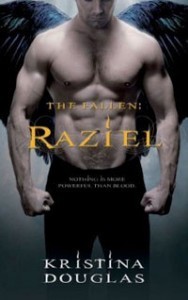
Jenny Crusie's You Again and Lavender's Blue will be out from St. Martin's Press a year after she finishes them; when is anybody's guess.


